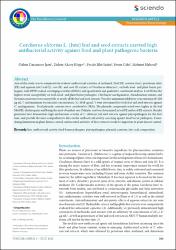| dc.contributor.author | İşeri, Özlem Darcansoy | |
| dc.contributor.author | Körpe, Didem Aksoy | |
| dc.contributor.author | Şahin, Feride İffet | |
| dc.contributor.author | Cabi, Evren | |
| dc.contributor.author | Haberal, Mehmet | |
| dc.date.accessioned | 2023-04-20T08:04:13Z | |
| dc.date.available | 2023-04-20T08:04:13Z | |
| dc.date.issued | 2022 | |
| dc.identifier.issn | 2564-615X | |
| dc.identifier.uri | https://doi.org/10.2478/ebtj-2022-0011 | |
| dc.identifier.uri | https://hdl.handle.net/20.500.11776/11025 | |
| dc.description.abstract | Aim of this study was to comparatively evaluate antibacterial activities of methanol (MetOH), acetone (Ace), petroleum ether (PE) and aqueous (dw) leaf (L), root (R), and seed (S) extracts of Corchorus olitorius L. on both food- and plant-borne pathogens, with DPPH radical scavenging activities (DRSA), and quantitative and qualitative constituent analysis. Leaf PE has the highest strain susceptibility on both food- and plant-borne pathogens. Clavibacter michiganensis, Pseudomonas tomato, and Erwinia caratovora were susceptible to nearly all the leaf and seed extracts. Very low minimum inhibitory concentration (8-128 mL(-1)) and minimum bactericidal concentration (32-2048 mu g mL(-1)) were determined for both leaf and seed extracts against C. michiganensis. Total phenolic contents were correlated to DRSA. The phenolic compounds tested were higher in the leaf MetOH, cholorogenic acid being the most abundant one. Palmitic acid was determined in leaf PE and seed PE extracts. Results presented here demonstrate high antibacterial activity of C. olitorius leaf seed extracts against phytopathogens for the first time, and provide the most comprehensive data on the antibacterial activity screening against food-borne pathogens. Considering limitations in plant disease control, antibacterial activities of these extracts would be important in plant disease control. | en_US |
| dc.description.sponsorship | Baskent University Research Fund; Baskent University Institutional Review Board [DA10/17] | en_US |
| dc.description.sponsorship | This study was approved by Baskent University Institutional Review Board (Project no: DA10/17), and supported by Baskent University Research Fund. | en_US |
| dc.language.iso | eng | en_US |
| dc.publisher | Sciendo | en_US |
| dc.identifier.doi | 10.2478/ebtj-2022-0011 | |
| dc.rights | info:eu-repo/semantics/openAccess | en_US |
| dc.subject | Jute | en_US |
| dc.subject | Antibacterial Activity | en_US |
| dc.subject | Food-Borne Pathogens | en_US |
| dc.subject | Phytopathogens | en_US |
| dc.subject | Phenolic Contents | en_US |
| dc.subject | Fatty Acid Composition | en_US |
| dc.subject | Antimicrobial Activities | en_US |
| dc.subject | Essential Oils | en_US |
| dc.subject | Antioxidant | en_US |
| dc.subject | Genotoxicity | en_US |
| dc.subject | Acid | en_US |
| dc.title | Corchorus olitorius L. (Jute) leaf and seed extracts exerted high antibacterial activity against food and plant pathogenic bacteria | en_US |
| dc.type | article | en_US |
| dc.relation.ispartof | Eurobiotech Journal | en_US |
| dc.department | Fakülteler, Fen Edebiyat Fakültesi, Biyoloji Bölümü | en_US |
| dc.authorid | Haberal, Mehmet/0000-0002-3462-7632 | |
| dc.identifier.volume | 6 | en_US |
| dc.identifier.issue | 3 | en_US |
| dc.identifier.startpage | 105 | en_US |
| dc.identifier.endpage | 115 | en_US |
| dc.institutionauthor | Cabi, Evren | |
| dc.relation.publicationcategory | Makale - Uluslararası Hakemli Dergi - Kurum Öğretim Elemanı | en_US |
| dc.authorwosid | Haberal, Mehmet/AAJ-8097-2021 | |
| dc.identifier.wos | WOS:000827165800002 | en_US |



















